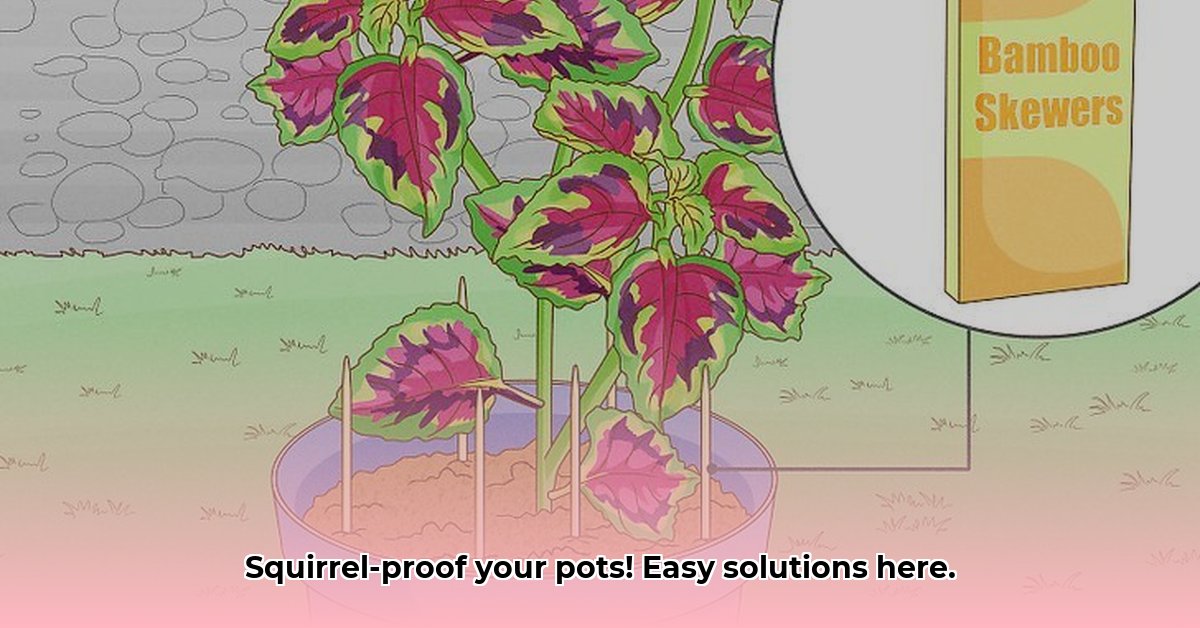Squirrels digging in your flower pots? It’s a common frustration, but there’s hope! This guide offers proven strategies to protect your precious plants from these persistent pot raiders. Learn how to identify squirrel damage, deter these furry fiends, and create the thriving container garden you’ve always dreamed of.
Building a Squirrel-Proof Fortress: Barrier Methods
Think of your flower pots as tiny castles under siege. Your mission? Construct defenses to keep out the invaders. These barrier methods physically block squirrels from reaching your plants.
Shielding with Rocks and Stones
This simple yet effective method uses a layer of rocks to deter digging.
- Gather Materials: Source small to medium-sized rocks, like pea gravel or river rocks, from your garden center or backyard.
- Deploy the Armor: Spread a 1-inch layer of rocks over the potting soil, creating a barrier squirrels dislike digging through.
Pros: Simple, effective, improves drainage, and can be aesthetically pleasing.
Cons: Adds weight to pots and can be costly for many containers.
Netting and Mesh: Creating a Cage
Netting acts as a physical barrier, preventing squirrels from accessing the soil.
- Choose Your Material: Select chicken wire, plastic netting, or hardware cloth (stronger metal mesh).
- Build the Defense: Lay the netting over the pot, weaving stems through the gaps, or create a cage around the container. Ensure the holes are small enough to prevent squirrels from squeezing through.
Pros: Highly effective physical barrier.
Cons: Can be unsightly.
Bamboo Skewers: A Prickly Perimeter
This inexpensive method creates a prickly surface that deters digging.
- Gather Skewers: Purchase bamboo skewers.
- Create the Barrier: Insert skewers into the soil around plants, pointy-end up, creating a prickly perimeter.
Pros: Inexpensive and easy to implement.
Cons: May not deter determined squirrels.
Repelling with Scents: Olfactory Warfare
Squirrels have a keen sense of smell. Use this to your advantage with scent-based deterrents.
Coffee Grounds: Repurposing for Repelling
Recycle used coffee grounds to deter squirrels with their strong aroma.
- Save Your Grounds: Collect used coffee grounds.
- Spread the Deterrent: Sprinkle a generous layer of coffee grounds over the soil.
Pros: Free, readily available, and adds nutrients to the soil.
Cons: Needs frequent reapplication, especially after rain.
Spicy Surprise: Bringing the Heat
Cayenne pepper or chili flakes create an irritating sensation that squirrels dislike.
- Apply the Spice: Sprinkle cayenne pepper or chili flakes directly onto the soil.
- Spicy Spray (Optional): Boil hot peppers in water, cool, strain, and spray around plants (use gloves and avoid contact with eyes).
Pros: Can be very effective.
Cons: Can irritate skin and eyes; reapplication needed. Some research suggests that prolonged exposure to capsaicin, the active ingredient in chili peppers, may have detrimental effects on soil health, although more research is needed on this.
Homemade Spice Repellent Spray: A Concoction of Confusion
A blend of strong scents creates a confusing and unpleasant experience for squirrels.
- Brew the Mixture: Steep mint leaves, cayenne pepper, garlic, and boiling water for 24 hours.
- Strain and Spray: Strain the mixture into a spray bottle and apply around plants.
Pros: Customizable and natural.
Cons: Requires preparation time.
Other Deterrents: Outsmarting Squirrels
These creative methods utilize squirrels’ natural behaviors and dislikes.
Shiny Objects: Dazzling and Disorienting
Shiny, moving objects can disorient and frighten squirrels.
- Gather Shiny Objects: Collect old CDs, pinwheels, or small mirrors.
- Hang the Deterrents: Place the objects near your pots.
Pros: Easy and inexpensive.
Cons: Effectiveness may decrease over time.
Plants Squirrels Dislike: Nature’s Repellents
Certain plants, like marigolds and nasturtiums, have scents that squirrels may dislike. While the effectiveness of this method can vary widely, it can be a relatively low-effort and visually appealing option.
Pros: Natural and aesthetically pleasing.
Cons: May not be sufficient on its own. Ongoing research is exploring the efficacy of various plants as squirrel repellents.
Motion-Activated Sprinklers: Startling the Intruders
These sprinklers detect motion and spray water, startling squirrels and deterring them from the area.
Pros: Highly Effective. Squirrels quickly learn to associate the area with an unpleasant surprise.
Cons: Can be expensive and requires a water source and proper setup. May not be suitable for all garden layouts.
Strategic Combinations: Maximizing Effectiveness
The most effective approach often involves combining multiple methods. Try pairing coffee grounds with rocks or netting with a spicy spray. Experiment to find what works best in your garden. Rotating methods can also keep squirrels guessing.
Troubleshooting Persistent Squirrels
If squirrels persist, don’t give up! Try different combinations, reinforce barriers, and rotate scents. Patience and persistence are key to winning this battle of wits.
Comparison Table: Choosing the Right Strategy
| Method | Effectiveness | Cost | Pet Safety | Aesthetics | Notes |
|---|---|---|---|---|---|
| Rocks/Stones | Moderate | Low | Safe | Moderate | Adds weight |
| Netting/Mesh | High | Low-Med | Safe | Low | Can be unsightly |
| Bamboo Skewers | Low-Med | Low | Safe | Low | Easy solution |
| Coffee Grounds | Moderate | Low | Safe | Neutral | Reapply after rain |
| Cayenne Pepper/Chili Flakes | Moderate-High | Low | Use with Caution | Neutral | Can irritate skin/eyes, reapply |
| Spice Repellent Spray | Moderate | Low | Generally Safe | Neutral | Requires preparation |
| Shiny Objects | Low | Low | Safe | Variable | Effectiveness may decrease |
| Plants Squirrels Dislike | Low-Moderate | Moderate | Varies | High | Not always effective |
| Motion-Activated Sprinklers | High | High | Safe | Variable | Requires water source and setup |
Identifying Squirrel Damage
Look for telltale signs like scattered soil, unearthed bulbs, clipped stems, missing fruits or seeds, and small, dark droppings. This confirms squirrels are the culprits.
Choosing the Right Tactic
The best approach often involves a combination of strategies. Consider the specific layout of your garden, the types of plants you have, and whether you have pets or children.
By following these tips and adapting them to your specific situation, you can successfully protect your flower pots and enjoy a beautiful, squirrel-free garden.
- Best Books on Meditation Recommended by Mindfulness Experts - January 30, 2026
- Best Mindfulness Books for Anxiety, Sleep, and Daily Peace - January 29, 2026
- Books On Mindfulness For A Happier, More Present Life - January 28, 2026
















